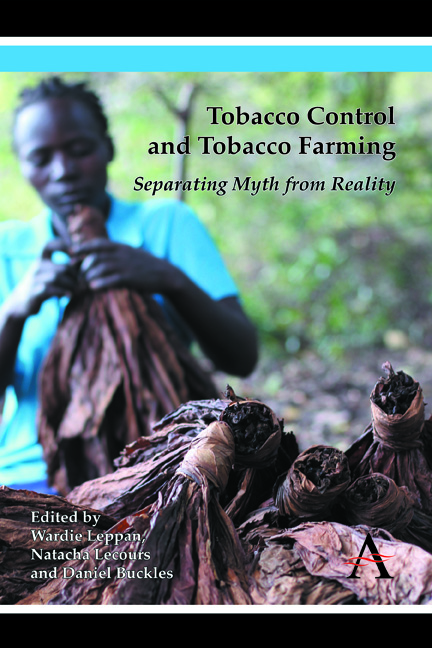Book contents
- Frontmatter
- Contents
- List of Figures, Tables and Photographs
- Foreword
- Preface
- Introduction: Separating Myth from Reality
- Section One The Determinants of Tobacco Leaf Demand
- Section Two Tobacco-Farming Conditions in Low- and Middle-Income Countries
- Chapter 4 The Harsh Realities of Tobacco Farming: A Review of Socioeconomic, Health and Environmental Impacts
- Section Three Economically Sustainable Alternatives to Tobacco
- Conclusion: Reframing the Debate on Tobacco Control and Tobacco Farming
- Annex: A Policy Brief on Tobacco Control and Tobacco Farming
- Contributors
Chapter 4 - The Harsh Realities of Tobacco Farming: A Review of Socioeconomic, Health and Environmental Impacts
from Section Two - Tobacco-Farming Conditions in Low- and Middle-Income Countries
Published online by Cambridge University Press: 05 November 2014
- Frontmatter
- Contents
- List of Figures, Tables and Photographs
- Foreword
- Preface
- Introduction: Separating Myth from Reality
- Section One The Determinants of Tobacco Leaf Demand
- Section Two Tobacco-Farming Conditions in Low- and Middle-Income Countries
- Chapter 4 The Harsh Realities of Tobacco Farming: A Review of Socioeconomic, Health and Environmental Impacts
- Section Three Economically Sustainable Alternatives to Tobacco
- Conclusion: Reframing the Debate on Tobacco Control and Tobacco Farming
- Annex: A Policy Brief on Tobacco Control and Tobacco Farming
- Contributors
Summary
Multinational tobacco corporations and their associated organizations have for decades claimed that tobacco growing brings prosperity and growth to farmers and farming communities, especially in low- and middle-income countries (LMIC). The industry has also ignored or denied the occupational health and environmental impacts of tobacco farming. Recently, the rhetoric may have shifted. A 2012 study commissioned and funded by the British American Tobacco Company (BATC) concludes that tobacco farming is simply no worse than any other industrial crop (Pain et al. 2012, Part A: 65). It also, based on a sample of only 40 households spread across three countries, argues that there is no evidence of a direct cause–effect relationship between tobacco cultivation and deepening poverty, child labor, indebtedness, food insecurity, environmental degradation or occupational health hazards (Pain et al. 2012, Part B: 74–76). The implication drawn from the study is that the implementation of Articles 17 and 18 of the World Health Organization's Framework Convention on Tobacco Control (FCTC) would force tobacco farmers to turn to less economically beneficial crops for no reason and against their own interests.
This chapter responds to the claims in this study, and more generally by the tobacco industry, that tobacco farming is a good way to make a living and poses no significant risks that can't be mitigated. It does so by examining the available evidence on the economic benefits and costs of tobacco farming in LMICs and the unique health and environmental effects of the industry.
- Type
- Chapter
- Information
- Tobacco Control and Tobacco FarmingSeparating Myth from Reality, pp. 99 - 138Publisher: Anthem PressPrint publication year: 2014



